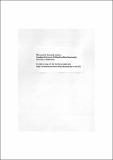| dc.description.abstract | This study examines broadly the Federal land policy framework as well as
legislation pertaining to land issued recently by the four main Killils, namely,
Tigrai, Amhara, Oromia and Southern Killil. It also looks into the new initiatives
undertaken by the government to address the problems of tenure insecurity, namely
user right documentation, underway in Amhara and Tigrai, and resettlement.
Critics of the land system have argued that the policy promotes insecurity of tenure
because it allows, among other things, periodic redistribution, is inefficient because
it constrains land transactions and has inhibited the emergence of a dynamic land
market, promotes fragmentation of land and growing pressure on land resources
because it discourages rural people from leaving their farms for other employment
opportunities; it also gives the state immense power over the farming population
because land is state property. The legislations issued by the different Killils are not
in harmony with each other or with Federal legislation, and, all except that issued
by Oromia, have not sufficiently addressed the main causes of tenure insecurity.
One of the new initiatives being tried out in Tigrai and Amhara is user right
documentation. Documentation is being undertaken within existing legal and policy
frameworks. While it may be too early to judge, it does appear that documentation
has promoted a sense of security among peasants who have received the documents.
This is to be welcomed. However, the documents do not entitle holders any more
benefits than those contained in existing legislations. Holders cannot use the
document as collateral to borrow from financial institutions. Documentation has
been undertaken for the most part without the use of modern surveying and
mapping techniques. Documentation by itself, however well it is undertaken, will
not be sufficient to ensure full tenure security. The resettlement program now under
way is a cause for great concern. The program is already facing many difficulties
because it was carried out without adequate preparation, and under the erroneous
assumption that there is plenty of unused arable land in each Killil to accommodate
a large settler population.
The study concludes by stressing the need for a fresh public debate on the land
question, focusing on tenure security (instead of tenure regimes as has been the
case in the past) because, despite | en_GB |


